
How to Unlock Xiaomi Redmi 13C Phone without Any Data Loss

How to Unlock Xiaomi Redmi 13C Phone without Any Data Loss
In today’s digital age, our Android phones serve as the primary hub of our lives, holding a treasure trove of personal and professional data. Yet, the frustration of being locked out due to forgotten passwords or malfunctioning security features can be overwhelming, compounded by the fear of data loss during the recovery process. However, there’s a beacon of hope - a way to unlock your Android phone without any data loss. In this comprehensive guide, we will explore the latest techniques, tools, and methods to regain access to your Android device safely without a password, PIN, or fingerprint. Let’s dive into it now.
Part 1. How to Unlock Xiaomi Redmi 13C Phone with Dr.Fone - Screen Unlock (Android)
If you or someone accidentally forgot or mistyped/misentered your lock password and caused it to lock permanently, of course, you will find ways to unlock it at first. But if you are not connected to the internet, or did not register a Google account for your device, your last resort would be to factory reset your device. That will totally wipe everything you have and save it on your device. If you want to unlock your lock screen without having to worry that your device data will be erased, Dr.Fone - Screen Unlock (Android) is your phone unlocking software .

Note: This tool temporarily support unlocking part of Samsung and LG locked screen without losing data, but other Android phone will be wiped all data if you try to unlock the screen with Dr.Fone - Screen Unlock (Android).
Dr.Fone - Screen Unlock (Android)
Remove 4 Types of Android Screen Lock without Data Loss
- It can remove 4 screen lock types - pattern, PIN, password & fingerprints.
- Only remove the lock screen. No data loss at all.
- No tech knowledge asked. Everybody can handle it.
- Work for Samsung Galaxy S/Note/Tab series and LG G2/G3/G4.
4,464,578 people have downloaded it
Steps on How to Unlock an Android Phone with Dr.Fone - Screen Unlock (Android)
Step 1. Connect your Android phone to your PC with Dr.Fone installed, then run the program.
Step 2. Then, you should see the “Screen Unlock” tool, so proceed into it. After that, click “Android” > “Unlock Android Screen.”
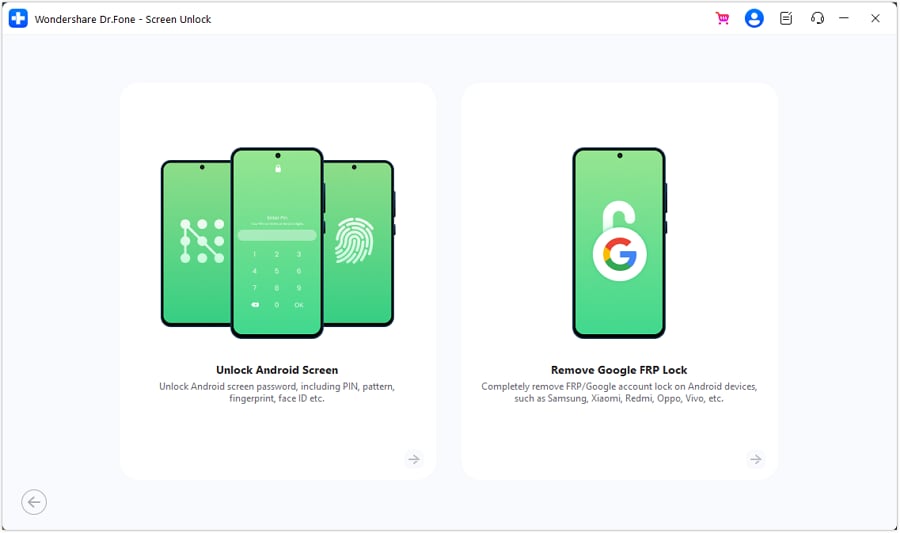
Step 3. Then choose “Remove without Data loss” to unlock part Samsung/LG devices without data loss and find your device model.
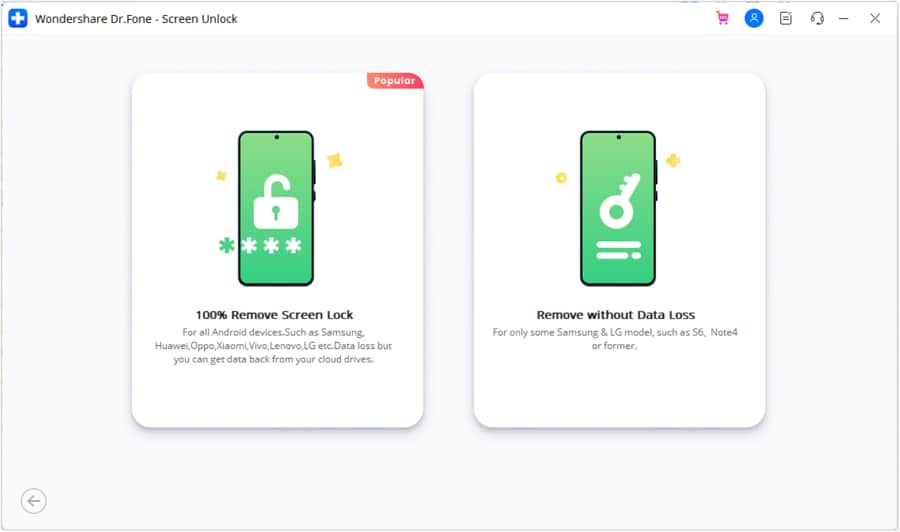
Step 4. Follow the instructions on the program to get the Android phone into “Download Mode.”
- 1. Power off the phone.
- 2. Press and hold volume down + home button + power button at the same time.
- 3. Press the volume up to enter download mode.
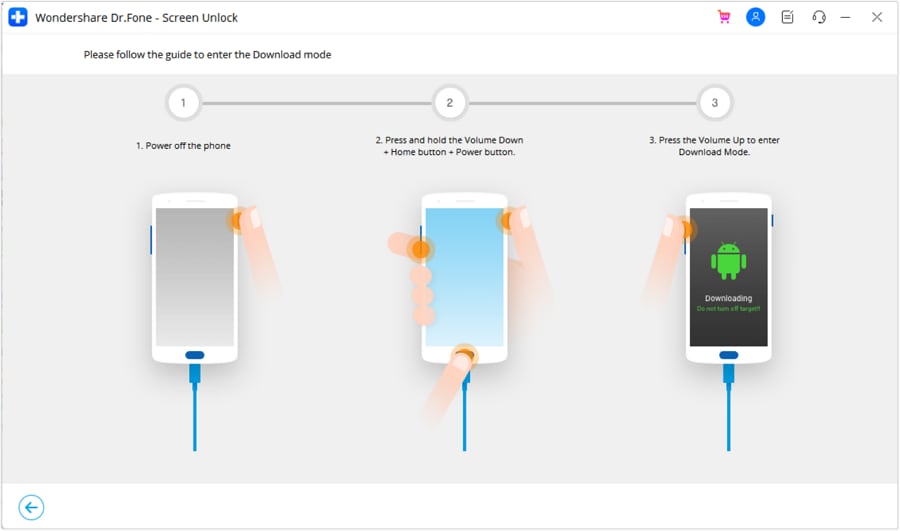
Step 5. The loading process will take you a few minutes because it is going to verify first your device’s compatibility.
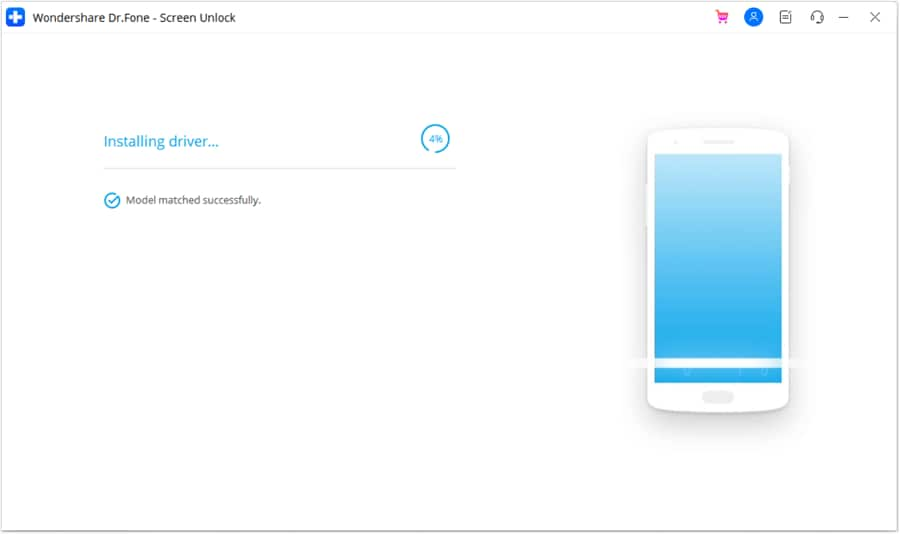
Step 6. Wait until everything is done. You should then see your device already has no lock screen.
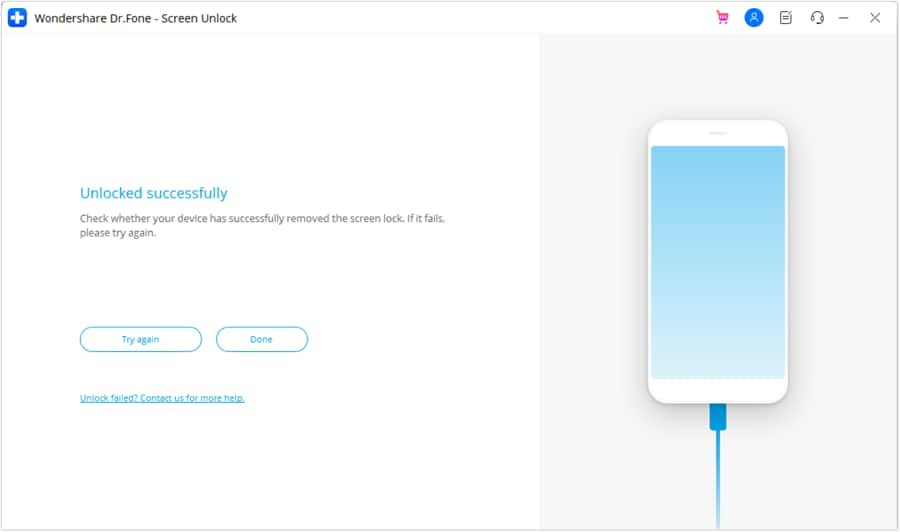
That’s how to unlock an Android phone with just one click using Wondershare’s Dr.Fone. If your device is not Samsung or LG, you can use a more advanced mode to unlock your phone .
Part 2. How to Unlock Android Phone with Aroma File Manager (with Data Loss)/h2>
If you weren’t able to open your Wi-Fi or data connection or enable USB Debugging, this is the way for you to unlock your lock screen. This could be a bit complicated, but it should work.
Steps are provided below, and please follow the step-by-step guide carefully to avoid a boot loop or any other damage.
Step 1. Download Aroma File Manager on your PC. This is a tool that unlocks Android phones. Android users can use it for free.
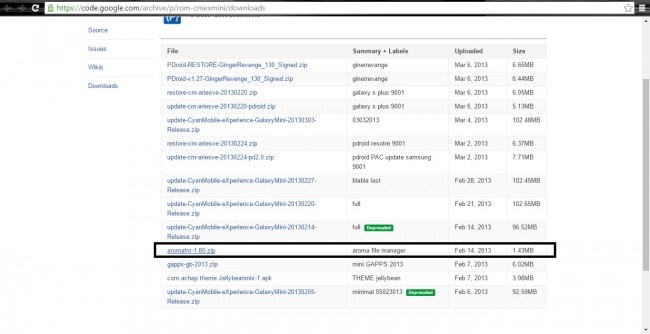
Step 2. Go to your Downloads folders and copy the downloaded zip file.
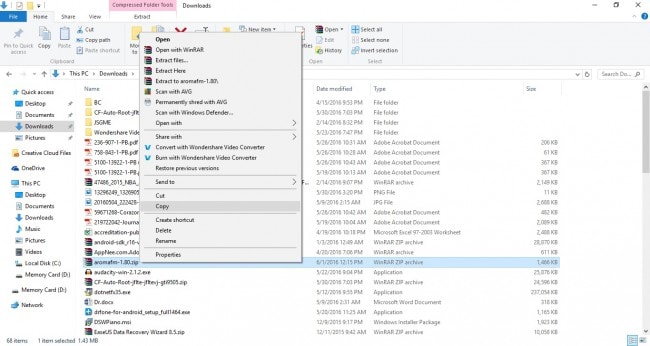
Step 3. Plug into your PC a memory card that you can insert into your phone later. Then, go to your list of connected devices and select the memory card.
Parental Control Software
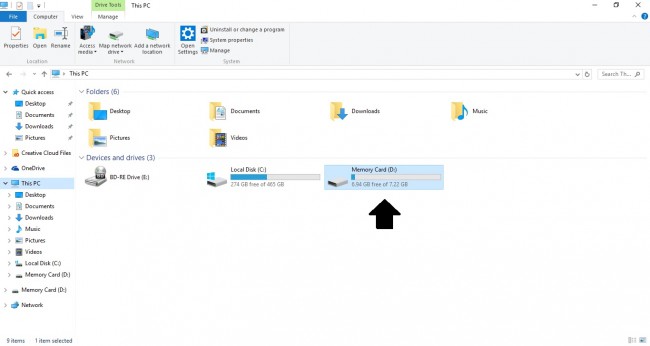Step 4. Paste the copied Aroma zip file. Once copied, eject it from your PC, then insert it into your Android device.
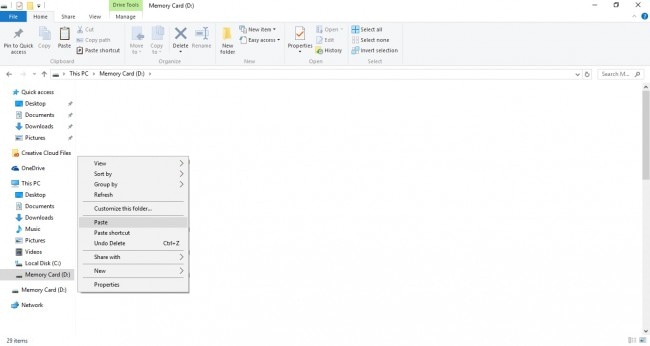
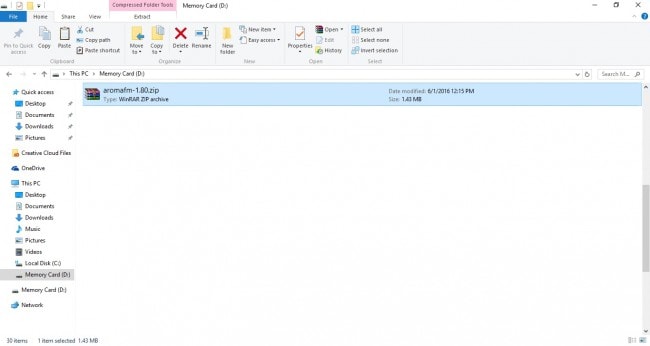
Step 5. Enter Recovery Mode for your device. Each Android device has its own ways of entering recovery mode, so take a look at this link and find your device.
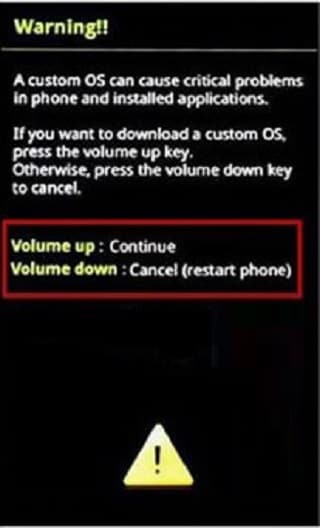
Step 6. When you are already in Android Recovery Mode, use your volume keys to navigate to ‘’apply update from external storage’’, then select the zip file you copied a while ago. It will be flashed on your device.
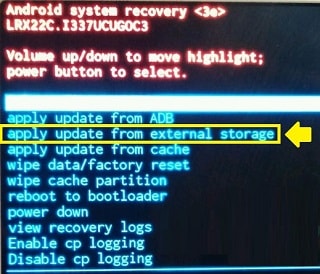
Step 7. After it, restart, and recovery mode will reopen as Aroma File Manager, so go to its settings and select ‘’Automount all devices on start’’, then restart. Back in Aroma File Manager, go to the directory data>system. Check if the ff. exist. If they do, delete them. Then restart again.
- gesture.key (pattern) / password.key (password)
- locksettings.db
- locksettings.db-shm
- locksettings.db-wal
- signature.key
- sparepassword.key
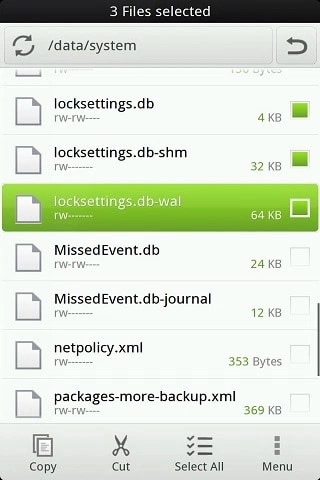
Now you have your device booted up, and your Android lock screen is still locked, just gesture in or enter anything. It will be unlocked. And that’s how to unlock an Android phone using your device.
Part 3. How to Unlock Android Phone Using Minimal ADB and Fastboot (with Data Loss)
If you weren’t able to connect to the Internet, but you, fortunately, enabled your USB Debugging option before your device was locked, the ARONSDB tool from the Android SDK package can help you unlock your Android phone.
Here is the step-by-step guide for you to follow
Step 1. Go to Minimal ADB and Fastboot download page.
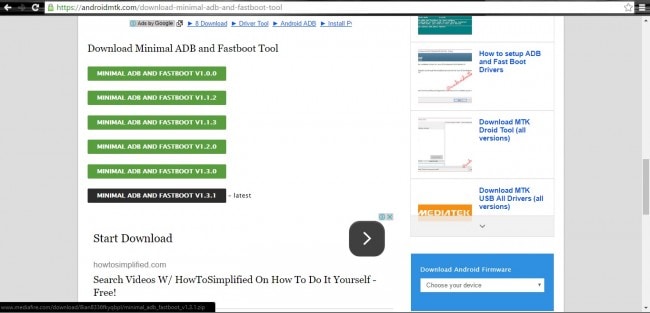
Step 2. Download the tool’s latest version.
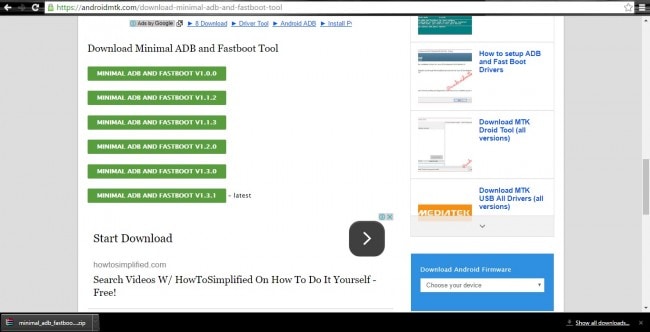
Step 3. Open the downloaded Minimal ADB and Fastbootzip file and install it.
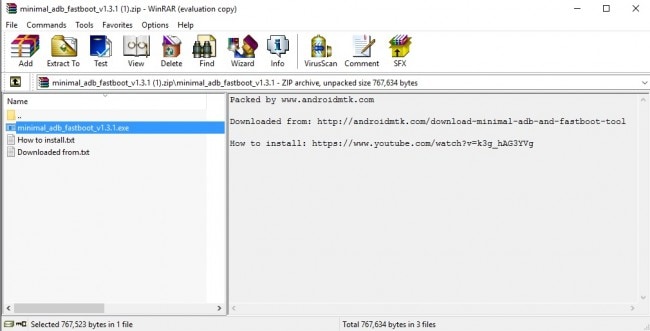
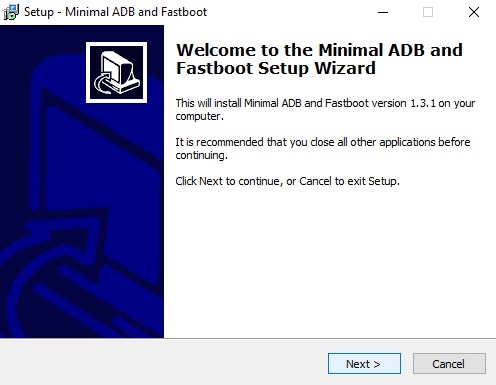
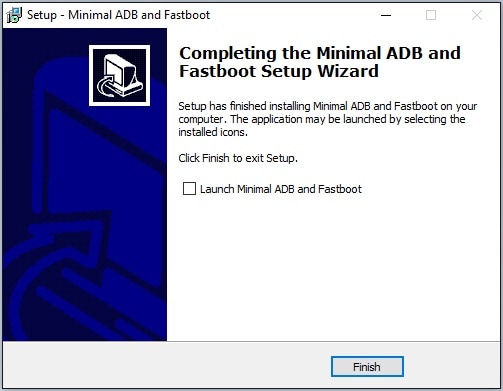
Step 4. Make sure your device is connected, then go to the Minimal ADB and Fastboot installation directory.
This PC [Win 8& 10] or My computer [Windows 7 & below]> Local Disk (C:) [primary drive]> Program Files [for 32-bit] or Program Files (x86) [for 64-bit] > Minimal ADB and Fasboot.
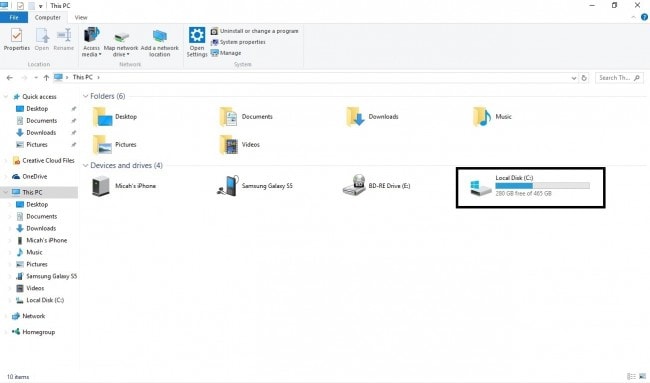
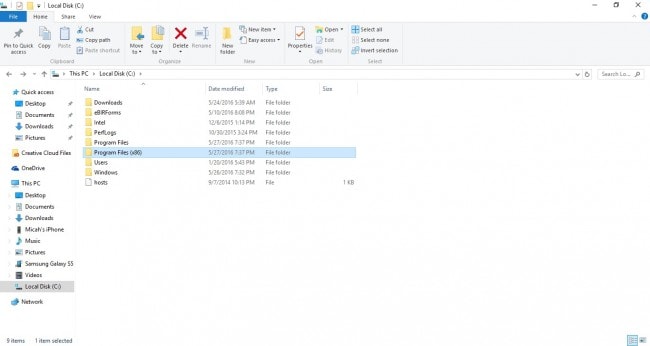
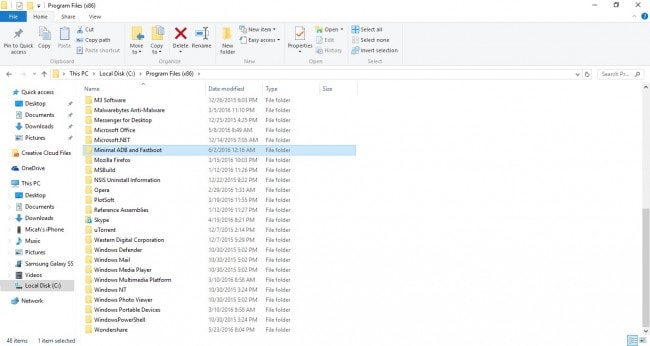
Step 5. Inside the folder, hold the Shift key on your keyboard, then right-click your mouse. An additional “Open command window here” will appear so select that.
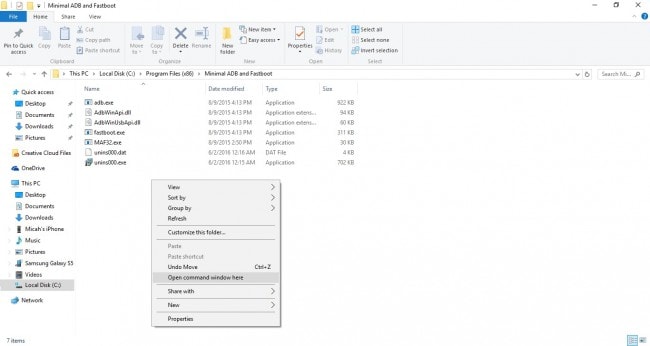
Step 6. ADB terminal will pop out. Now, the first is to type in ADB devices. This is to check if your device is recognized by ADB. If there is no device listed below, try to remove and reconnect your Xiaomi Redmi 13C and retype the command. If there are listed devices already, proceed.
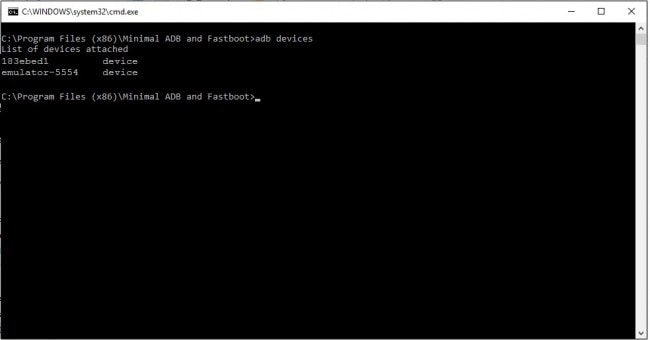
Step 7. Finally, type in the following commands one by one. These commands will remove your lock screen.
- adb shell
- cd /data/data/com.android.providers.settings/databases
- sqlite3 settings.db
- update system set value=0 where
- name=’lock_pattern_autolock’;
- update system set value=0 where
- name=’lockscreen.lockedoutpermanently’;
- .quit
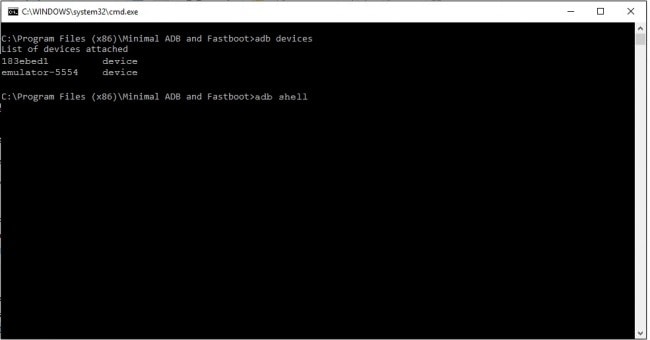
This would work if you have your USB debugging turned on before it was locked. That’s how to unlock Android using ADB.
Part 4: How to Unlock Phone via Find My Device (with Data Loss)
Google Find My Device is another handy way to unlock your locked Android device. However, it requires you to have your Google ID credentials and you have previously enabled Find My Device features. Moreover, it will erase all the data on your device. Use the following steps to unlock your Android phone via Find My Device:
Step 1: Open a web browser on a computer or another device and visit the Find My Device website. Now, sign in with the Google account that is linked to the locked Android device.
Step 2: After signing in, you will see a list of devices associated with your Google account on the left side of the screen. Select the locked Android device from the list and choose the “Erase Device” option from the menu on the left-hand side.
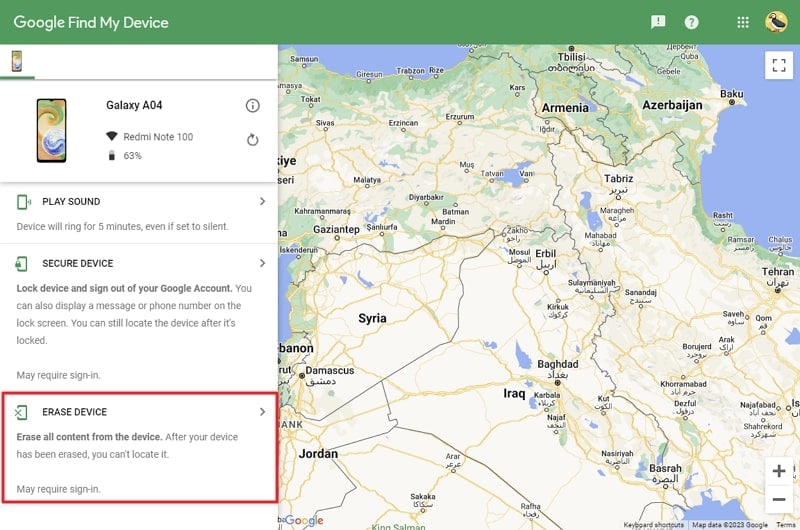
Step 3: You will now be asked to confirm your identity through a Google account password or using a pass-key. Afterward, follow the on-screen instructions to erase and unlock your Android device.
Part 5: How to Unlock Android Phone without Losing Data in Safe Mode
One way to unlock your Android phone without losing the data is by utilizing Safe Mode. This method works only if the screen lock you have been using is a third-party app. Since Safe Mode disables third-party apps, you can easily use it to uninstall the problematic app. Here is how to unlock an Android phone without losing data:
Step 1: On your Android device, press and hold “Power” and “Volume Down” keys together for 3 seconds. After the Power menu becomes visible, press and hold the “Power off” option.
Step 2: After a while, you will see the “Safe Mode” option on your screen with some basic instructions. Now, you can use the button to boot into Safe Mode and remove the screen lock application.

Part 6. How to Unlock Android Phone without Any Data Loss Using Google Account (Android 4.4 or lower)
If luckily, you left your Wi-Fi open and luckily connected to the internet, this is the easiest way to unlock your Android phone.
The step-by-step guide for you to refer
Step 1: Retry the incorrect password or pattern until the ‘’Forgotten Password/Pattern’’ appears below. Then select that.
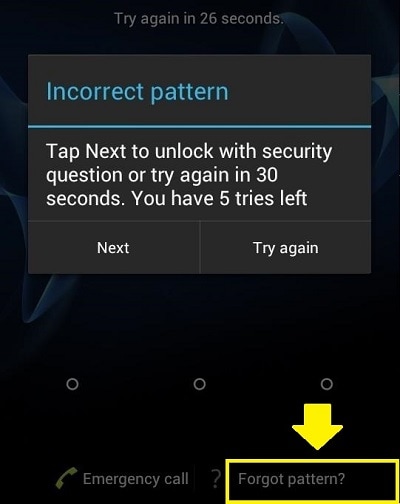
Step 2: Check ‘’Enter your Google Account details’’ then tap next.
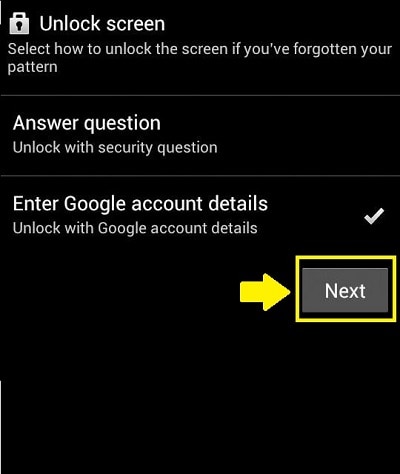
Step 3: Input your Google Account details, username, and password. You are done.
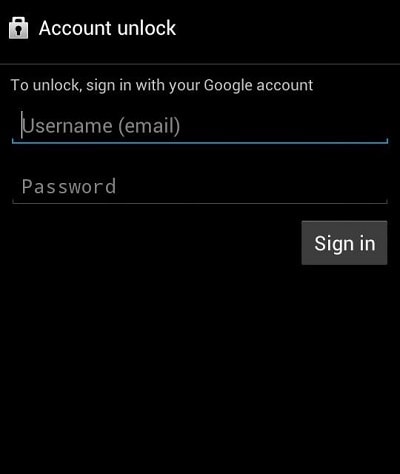
You will be given the option to input a new password or pattern right after you enter your Google account details. But if not, Google must have emailed you your temporary password or pattern that you will input to unlock your lock screen.
How to Remove Forgotten PIN Of Your Xiaomi Redmi 13C
Users of Android phones can benefit from data and file protection tools like passwords, patterns, and PINs. But there are also some significant hazards. For instance, your children may have repeatedly used the wrong password to access your Android phone, or you may have forgotten PIN on your device, pattern, or PIN.
We can use various valuable techniques to remove the Android phone password. According to you, the most typical or initial option must be factory reset. However, if you try to use the factory reset, you will lose all the data on your Android phone.
Read the information below, but first, let’s talk about Android phone passwords and how they operate before moving on to the ways.
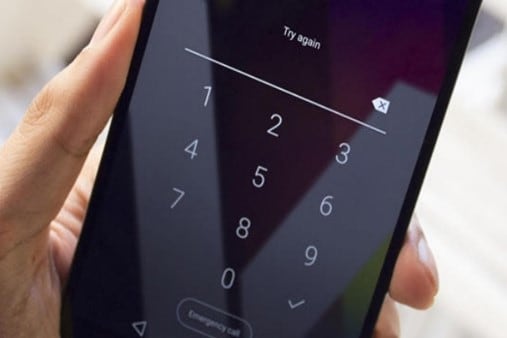
The Importance of the Android Lock System
In general, phone passwords are used to secure your device against unauthorized access and shield your files and data from it. You can try using a pattern, password, PIN, or another method to unlock your device. Although it has many benefits, there are also hazards. Risk in the sense that if you lose your device’s password or pattern, you will be unable to access it and will be stuck somewhere.
Several firms are making Android phones, so why shouldn’t more? Because Android phones are in high demand, numerous new businesses are now producing them. We can see that more people than any other operating system use mobile devices with Android. With an Android phone, we can do many functions, be constantly connected to the outside world, and everything runs smoothly.
This is an important issue that needs to be resolved right away. Therefore, some methods can assist you in getting out of it, one of which is doing a factory reset. They believe this is the most effective and secure way; thus, many try it. What about the information you have on the Xiaomi Redmi 13C device, though? What should you do next because a factory reset will destroy your data?
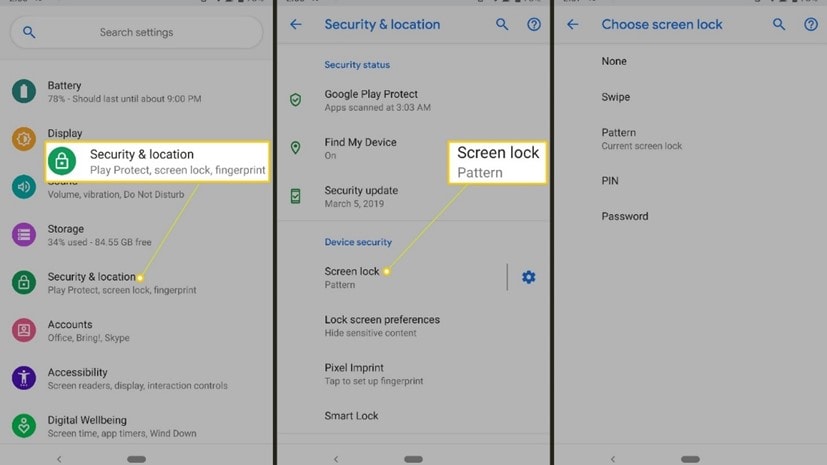
Methods to Recover Forgotten Password or PIN
1. Google Smart Lock
If you have added a trusted area or device in Google Smart Lock, you can go to that trusted area and reset your password. Alternatively, you can also use trusted devices to unlock your device.
2. Google Find My Device
As you are likely aware, every Android device is connected to a Google account. As a result, if you’d like, you may also use it to unlock Android. You’ll need to know your Google account login information for this. When you’re ready, use these instructions to find out how to unlock a phone password.
- Login using your Google credentials by going to the official Google Find My Device website.
- You will see the gadgets connected to your Google account as you enter the interface and a map of where they are.
- To wipe the Xiaomi Redmi 13C device, click the ERASE DEVICE option on the left side panel. You will then be required for your password.
- Once more, select “Erase.” This will reset the Xiaomi Redmi 13C device and get rid of the forgot pattern lock.
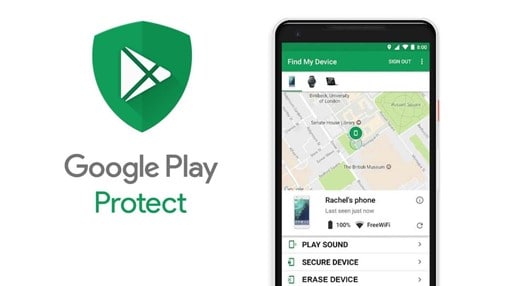
3. Recovery Mode
Users of Android smartphones and tablets can troubleshoot various issues with their devices using a feature known as Android Recovery Mode. If you discover that your device is functioning strangely, it might be helpful. Recovery Mode Android technically refers to a unique bootable partition with a recovery application installed inside it.
However, users can also use it to reset the android password if it is forgotten. The instructions for resetting android devices through recovery mode differ for every android device.
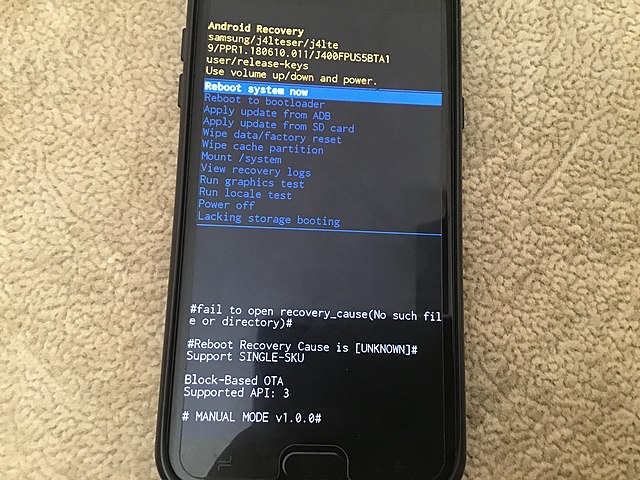
4. Dr.Fone - Screen Unlock
On most Android handsets, it is wise to give it a try on Dr.Fone to unlock the screen lock easily. It allows you to remove the password, PIN, pattern, and fingerprint from an Android phone.
Step 1. Select Unlock Android Screen
Please select “Unlock Android Screen” to ensure you have the correct unlock process.

Step 2. Select device model
If you see this page, please choose the option fitting your phone, otherwise, you can’t unlock your device as you wish.
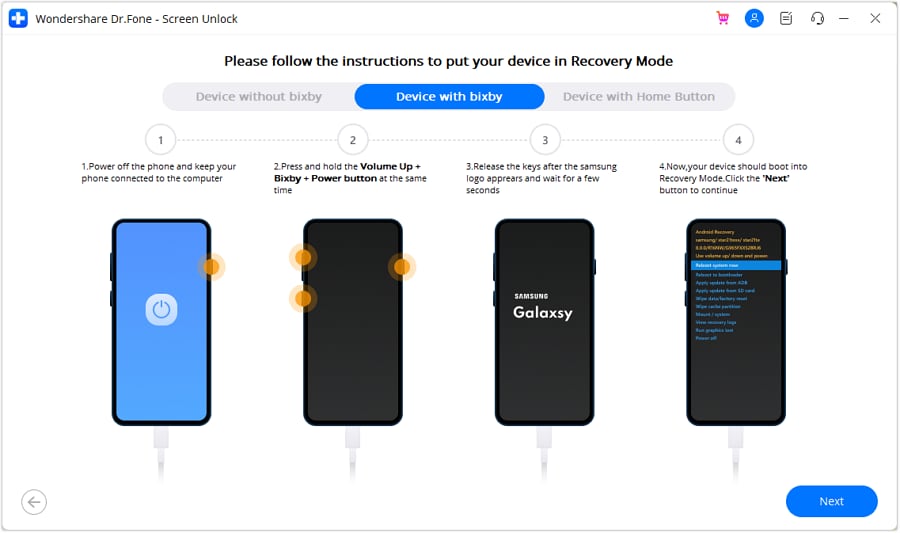
(Enter Recovery Mode via the Samsung phone with Bixby)
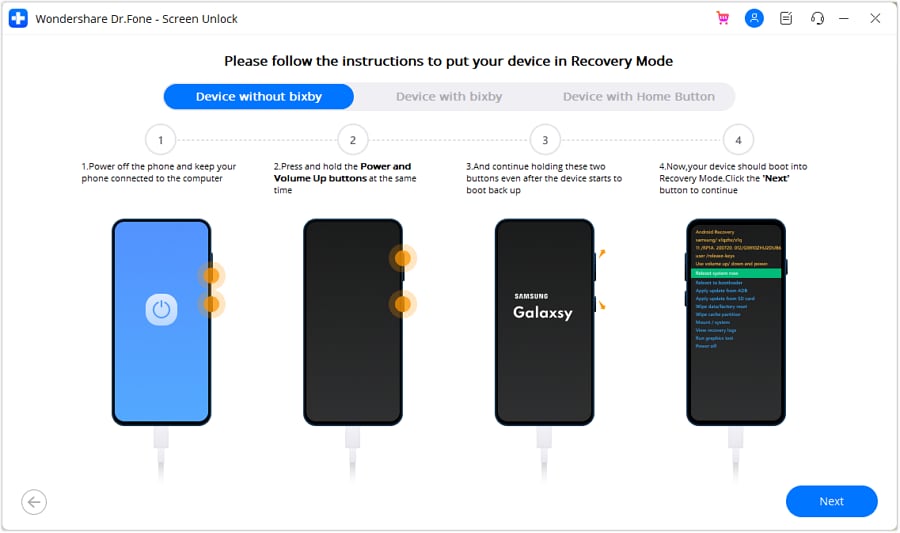
(Enter Recovery Mode via the Samsung phone without Bixby)
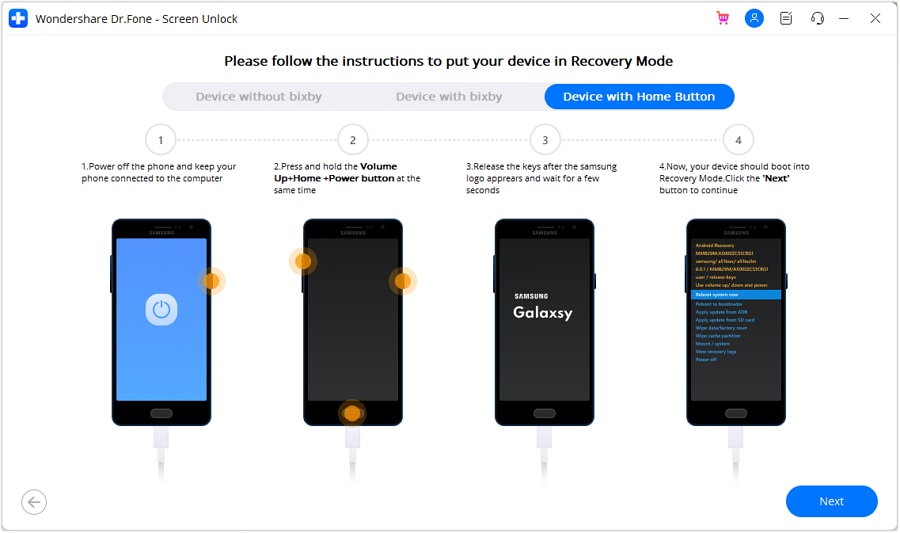
(Enter Recovery Mode via the Samsung phone with the Home button)
Step 3. Instructions to Wipe Cache Partition
On the page Recovery Mode, it’s the most important step to unlock your device. Please click the right buttons.
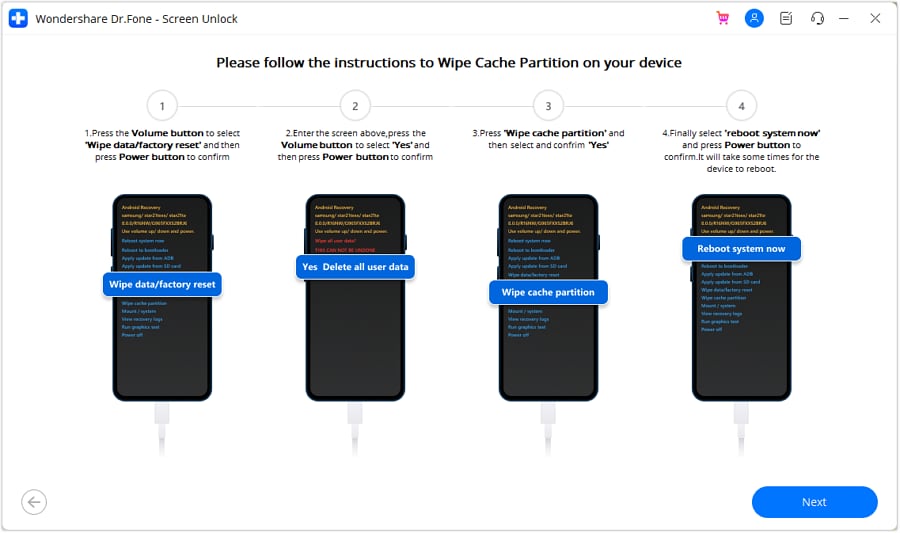
Congratulations! Now you can access your phone again, and there’re no obstacles when you do anything on your phone.
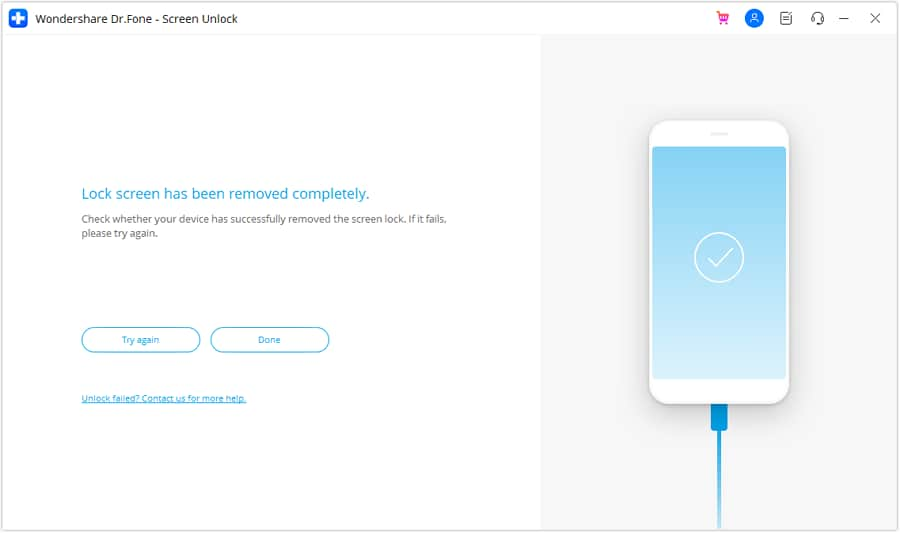
FAQs
- Will Dr.Fone - Screen Unlock Do Harm To My Xiaomi Redmi 13C?
Answer: No, Dr.Fone is safe for your device, all hardware will be safe, and you can still use your phone as usual when you try our products, but for devices other than Samsung and LG, you may have to face data loss. So, if you want to keep your data safe, please have a backup on your phone.
- How To Keep My Data Safe?
Answer: Dr.Fone - Phone Backup is a good option for backing up the sensitive data on your device. If you want to know more, don’t hesitate and find any required information on our website.
Conclusion
Any methods mentioned above can work to overcome the obstacle of unlocking the screen with your Android handset. The best thing about all methods we said is that you just need some easy ways to complete the tasks.
Downloading SamFw FRP Tool 3.0 for Xiaomi Redmi 13C
FRP (Factory Reset Protection) is a security feature for Android devices to prevent unauthorized access after a factory reset. SamFw FRP Tool is a popular solution for bypassing FRP on Samsung devices. Downloading the tool is crucial for users locked out of their devices.
The page discusses and evaluates its effectiveness with a comprehensive review. After that, you’ll see considering another option is wise, and the article will also recommend an alternative. Stay tuned for our insights. For now, you can download the SamFw FRP Tool for free and explore its features. Read on to learn more.
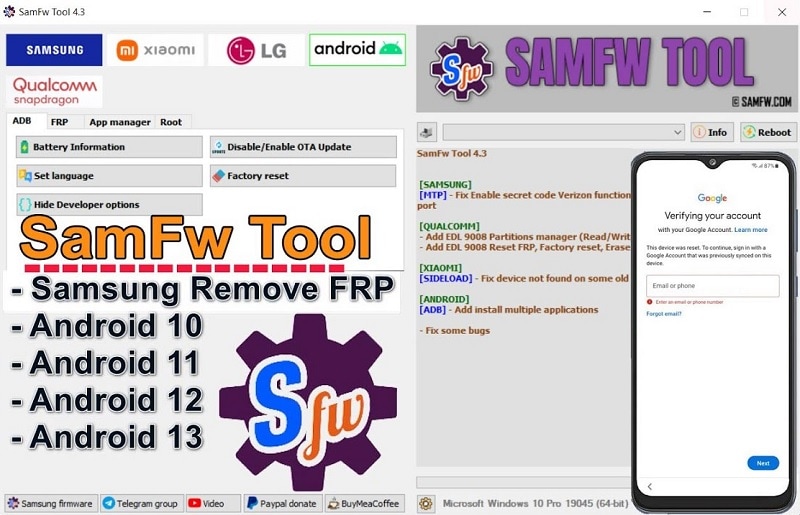
Part 1. A Detailed Introduction of SamFw FRP Tool
For many Samsung users, encountering a Google FRP lock can be a frustrating experience. A user recently reached out, saying:
“I’m facing a Google FRP lock issue on my recently acquired Samsung Galaxy S23 from eBay. Has anyone successfully used SamFw to bypass FRP without the previous owner’s account credentials?”
SamFw FRP Tool is designed to unlock Samsung devices afflicted by Google FRP locks. The tool aims to provide a solution for bypassing FRP without the previous owner’s credentials. It is beneficial for their Samsung devices to be locked out due to a factory reset.
Key Features of SamFw FRP Tool
Explore the essential features of the SamFw FRP Tool. Learn its key features for efficient Android device security solutions.
- Unlock Samsung without data loss
SamFw FRP Tool can unlock Samsung devices without causing any data loss during the process. It ensures that your personal information and files remain intact.
- Remove various Android locks
The tool can also remove other Android security measures. It can bypass pins, passwords, facial IDs, patterns, and fingerprints.
- Wide compatibility
SamFw FRP Tool supports a broad range of Android versions. It’s compatible with Android 5 to the latest Android 13.
- User-friendly FRP bypass
SamFw FRP Tool offers a straightforward solution to remove Google FRP locks. Its intuitive interface makes the process accessible for beginners.
### How To Use SameFw FRP ToolHere’s a comprehensive guide to help you bypass FRP using the Sam FRP bypass tool.
- Step 1: Download the SamFw FRP tool on your computer. Install the app and launch it afterward. Connect your Samsung to your computer.
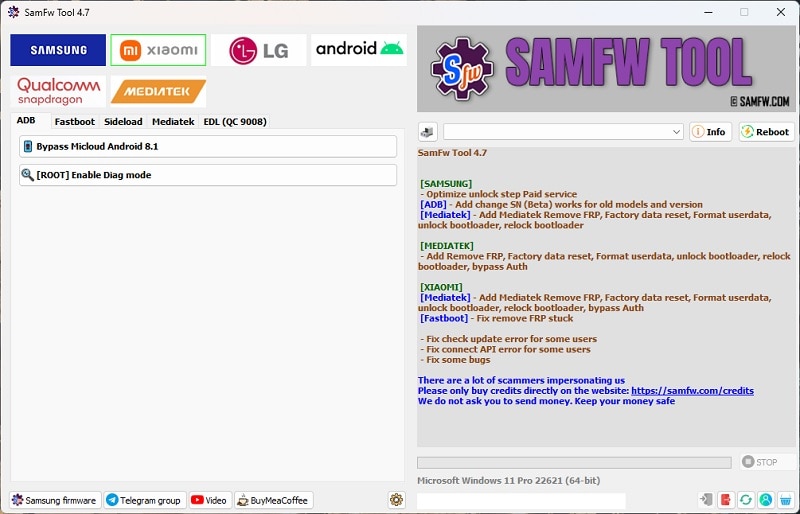
- Step 2: Choose your device’s brand and click the Remove FRP button. Your phone screen will then display a notification requesting USB debugging permission. Tap OK to proceed.

- Step 3: Allow the process to complete. Upon completion, your device will automatically reboot as part of the FRP removal process. The reboot signals that the process bypassed the FRP lock. Close the pop-up and enjoy unrestricted access to your device.

Note
It’s important to note that the _SamFw FRP Tool_ is only compatible with Windows OS. Users with Mac or Linux systems may need to explore alternative solutions for FRP bypass.
If you’re seeking a reliable and flexible alternative to the SamFw FRP tool, Wondershare Dr.Fone - Screen Unlock (Android) is the best choice. Its proven track record and various compatibilities offer a seamless solution for Android devices. In addition, it makes it easy to work on FRP lock without a PIN or Google Account. Let’s explore further below.
Part 2. Best SamFW FRP Tool Alternative: Wondershare Dr.Fone
Wondershare Dr.Fone - Screen Unlock (Android) is the go-to choice for many users seeking efficient FRP bypass methods. The app is available for Windows, Mac, and Linux, adding to its versatility. Here are some reasons why it’s the best alternative to the SamFw FRP Tool.

- Versatile lock screen removal. Dr.Fone excels in removing various Android lock screen types. It offers a comprehensive solution for users facing different security challenges.
- Pin and Google Account bypass. The tool bypasses FRP without the need for a PIN or Google Account. It provides a hassle-free experience for users.
- Fast unlock process. Dr.Fone ensures a swift unlocking process. With the ability to remove the lock screen within less than 5 minutes, it minimizes inconvenience.
- Extensive device compatibility. Supporting over 2000+ Android models, Dr.Fone Screen Unlock - Android boasts extensive compatibility. It’s a versatile and reliable choice for users with various devices.
How To Bypass FRP With Dr.Fone - Screen Unlock (Android)
Dr.Fone - Screen Unlock (Android) is the ultimate alternative to the SamFw FRP Tool. Follow the steps outlined to bypass FRP without complications using the platform.
- Step 1: Download and install Dr.Fone - Screen Unlock (Android) on your computer. Launch the program, and select Toolbox > Screen Unlock from the main menu. Click Android as the Xiaomi Redmi 13C device type to continue.
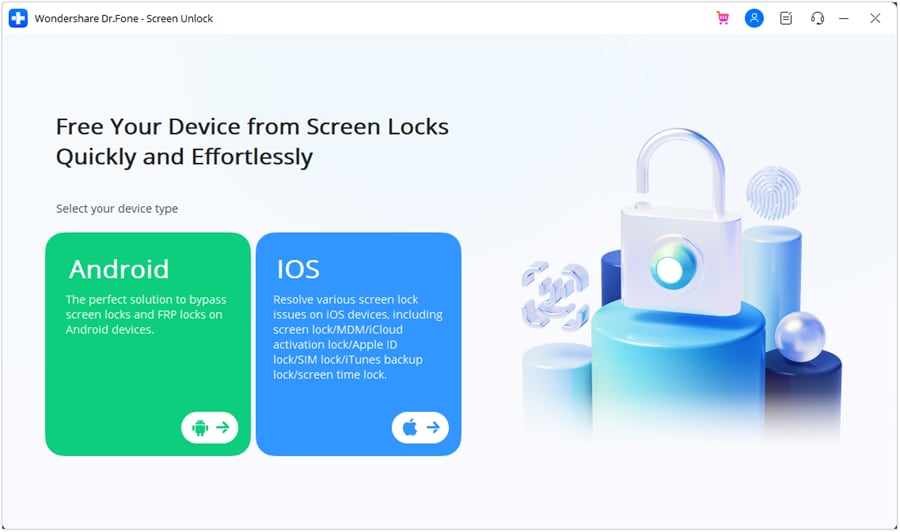
- Step 2: Connect your Android device to the computer using a USB cable. Choose the Remove Google FRP Lock option.

- Step 3: Choose your Android device type and click Start to proceed to the next window. Afterward, choose All Android versions (One-Click Removal) if you don’t know the OS version of your phone. Click the Start button again to continue.
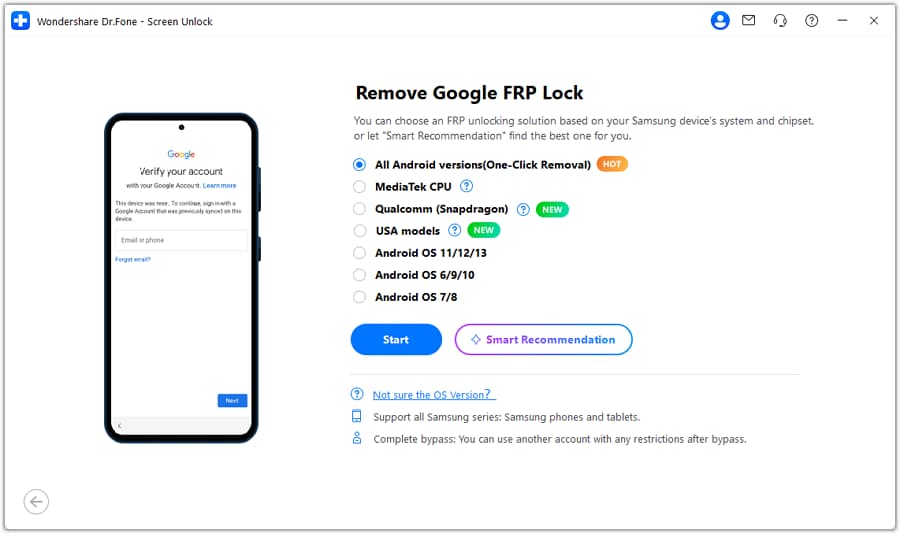
- Step 4: Next**,** follow the on-screen instructions. Locate the Emergency Call button on your Android and tap it. Dial “*#0*#” for a secret menu. Click Next in the app. Your Android will prompt the USB debugging option. Tap Allow on your phone, then click Authorized on your computer.
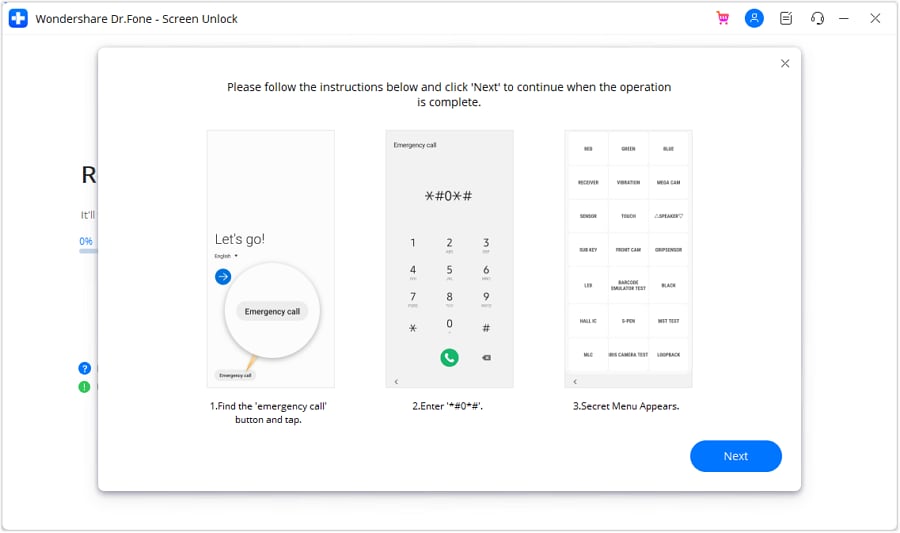
- Step 5: Dr.Fone will confirm the removal of the FRP locks from your Android device. After successful removal, the prompt window indicates completion. Click Done upon successful execution. If issues persist, retry the process with the Try Again option.
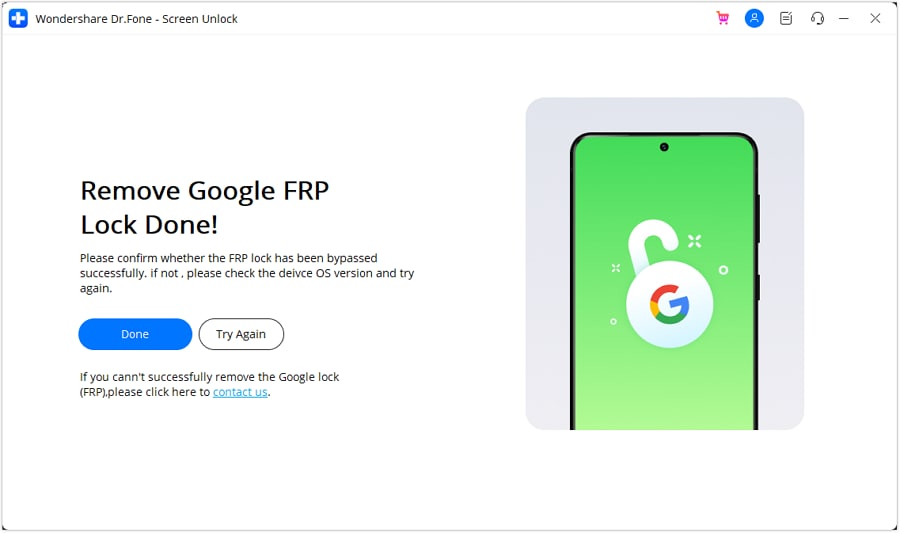
Part 3. Side-by-Side Comparison Between SamFw Tool and Dr.Fone
Choosing between SamFw Tool and Dr.Fone - Screen Unlock (Android) shouldn’t be hard. Here’s a concise side-by-side comparison evaluating their ease of use, speed, compatibility, features, and more.
| SamFw FRP Tool | Wondershare Dr.Fone | |
|---|---|---|
| Ease of Use | User-friendly interface, suitable for beginners | Intuitive design, making it accessible for all users |
| Unlock Speed | Efficient FRP bypass speed varies by device | Swift unlocking process, often under 5 minutes |
| Compatibility | Windows-only, limited OS compatibility | Wide compatibility with Windows and Mac, extensive Android device support |
| FRP Bypass Capability | Effective FRP removal, especially for Samsung devices | Bypasses FRP without a PIN or Google Account, versatile lock screen removal |
| Additional Features | Removes various Android lock screen types | Pin and Google Account bypass, extensive device compatibility |
Read More About FRP Bypass:
Top 5 Huawei Bypass FRP Tools for PC That Actually Work
Bypass FRP OPPO All Series like a Pro With/Without PC
Ways to Remove FRP Lock on Motorola Phones without a PC
Conclusion
SamFw FRP Tool is a viable option for users with FRP lock issues, particularly on Samsung devices. Its interface and effectiveness in removing FRP are noteworthy features. However, limitations arise with its Windows-only compatibility, which may impact user experience.
In comparison, Dr.Fone - Screen Unlock (Android) is a great alternative. Its design, fast unlocking process, and compatibility make it a versatile and reliable choice. The tool’s ability to bypass FRP without a PIN or Google Account adds to its appeal. Test both apps to see which one works best for your needs.
Tips: Forget your device password and can’t get access to it? No worries as Dr.Fone is here to help you. Download it and start a seamless unlock experience!
- Title: How to Unlock Xiaomi Redmi 13C Phone without Any Data Loss
- Author: Marry
- Created at : 2024-07-18 14:13:11
- Updated at : 2024-07-19 14:13:11
- Link: https://unlock-android.techidaily.com/how-to-unlock-xiaomi-redmi-13c-phone-without-any-data-loss-by-drfone-android/
- License: This work is licensed under CC BY-NC-SA 4.0.






